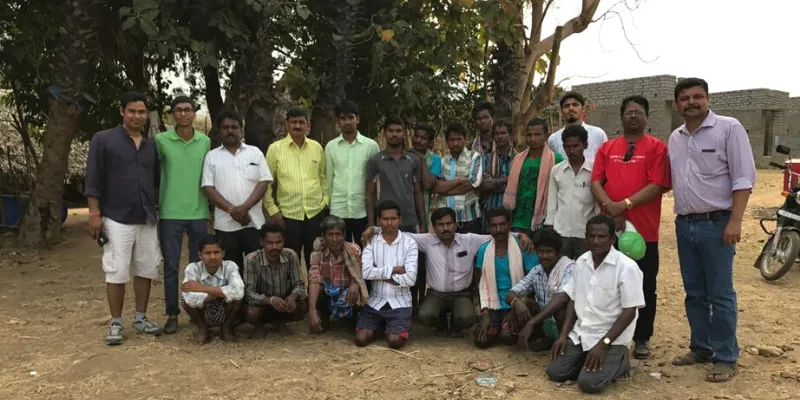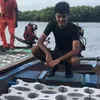Meet the social entrepreneur who is revolutionising the Indian inland fisheries industry
By linking farmer collectives, government schemes, research institutes, and the market, Neelkanth Mishra is unleashing the full potential of the fish and water plant industry in India for the benefit of small farmers.
For Neelkanth Mishra, inland fisheries always seemed like a viable means of creating livelihood for the 273 million small and landless farmers in India.
Born and raised in the industrial town of Jamshedpur in Jharkhand, Neelkanth self-identified as a changemaker from very early on in his life. The ability to empathise with people and their problems, co-create solutions, and build teams has been a constant narrative of his life. Neelkanth recalls that the very first time he engaged in a process of changemaking was at college, where he created a youth club to promote advancements in science and make them accessible to the student body.
Seeing the potential
Neelkanth’s passion to address problems has taken him on a journey with a number of organisations, small and large, where he got to understand and work with systems that were preventing struggling farmers from accessing sustainable livelihood opportunities. After participating in the Right to Food Movement in 2001, Neelkanth went on join Oxfam, where he saw the untapped potential of the inland fisheries sector as well as the struggles that the associated communities were facing.
Realising that there were numerous waterbodies across India and very limited focus on utilising these for economic opportunities, Neelkanth set out to explore what he could do. With 74 percent of Indian farmers being landless and/or small, most are vulnerable to exploitation by landowners and other middlemen in the supply chain. Realising that control was almost always out of the hands of individuals and communities, Neelkanth’s central question of exploration has been, ‘How do I give control of resources to farmers and take it away from people that can exploit them?’

Neelkanth Mishra with farmers
Gaining a deep understanding
“I realised that there were so many water bodies all over the country, but that very few organisations were working on or even looking at fisheries as a livelihood option. People were working on agriculture and livestock, but not this,” says the social entrepreneur.
From the point of view of a productive output, the country’s inland fisheries continue to constitute a cottage industry, producing 10 folds less than its full potential. Neelkanth realised that the industry was largely fragmented, with no standard code of conduct or policy for the leasing of these waterbodies.
Often, those with more power and access to resources are given the responsibility to both lease the lands and sell the output to the market, which leaves the farmers exposed to exploitation. While most fishermen in the industry have the skillset to catch fish, a majority doesn’t have the knowledge or expertise to undertake fish farming, which is diverse and complex in methodology.
Also, while there are government schemes that mandate agricultural research institutes to extend inputs, knowledge, and training to these communities, the resources often do not reach them, thus leaving them disadvantaged in their livelihood and critical resources underutilised.

Building an industry to impact livelihoods
Neelkanth established The Center for Aquatic Livelihood (Jaljeevika) with the vision of legitimising the sector and transforming it into one where farmers could access the resources and support they need for a sustainable livelihood.
At the core of this vision is the insight that access to shared aquatic resources needs to be placed in the hands of farming communities, such as cooperatives and women’s self-help groups (SHGs). Neelkanth believes that it is important the benefits of this high-potential industry are distributed to the farming communities themselves.
Understanding that building trust and highlighting the economic viability of the industry are the most important initial steps, Neelkanth works with newly formed farmer groups to identify water bodies in their local regions that they wish to ‘farm’. After identifying these, Neelkanth showcases the economic potential and diversity of output that exist in the entire value chain, from seed production and net making to breed diversity and other value-addition processes.
Once the collective groups show interest in engaging in this livelihood opportunity, Neelkanth’s organisation works with them to facilitate the short-term lease of the land and provide the necessary training and resources to get started.
These farmer collectives who start to reap the enormous economic benefits through shared resources start to automatically demand access to more knowledge to be able to increase their output and also source out new areas of value addition, such as access to credit and connection to markets.

Neelkanth through Jaljeevika, is able to facilitate this process of building institutional capacity, including leadership skill development and conflict management, so that these groups can operate as individual business entities. The farmer collectives also learn how to access existing government schemes for input resources and how to access credit and connect directly to the market, such that they retain control throughout the process.
Many of the members of the farming collectives have also started to launch their own micro ventures that facilitate niche value additions, such as fingerlings production or the process of filetting fish.
Neelkanth sees this empowerment of communities to be in control of their own destinies as being the most powerful evidence of impact, among the many other small changes that have been brought into their lives.
Influencing large institutions
Neelkanth is aware that his organisation cannot potentially provide services and support to all the farmers in the country who could benefit from this initiative. In order to scale the potential of his model, he is working with existing civil society organisations, state and central governments, and funding agencies to integrate inland fisheries into their programs.
He has already seen success through the integration of inland fisheries in the livelihood programs of six Indian states. He has also worked with numerous organisations to include it in their development and livelihood programs.
“I realised that one organisation or individual cannot fulfill the full potential that this sector has and that my role was to influence organisations to take it forward,” Neelkanth points out.
Changing the lives of small and landless farmers
To date, Jaljeevika has been creating employment for over 5000 people across India every year and, in the process, economically empowered many vulnerable farming communities.
In 2019 alone, its impact has reached 18,000 new farmers, who now see inland fishing as a viable means of economic prosperity. On average, individual households are generating an annual income of Rs 45,000, more than they would have otherwise. For farmers who are applying the best practices, the income exceeds Rs 1 lakh annually.
While acknowledging the impact in terms of these numbers, Neelkanth stresses that the economic empowerment leads to an equally important change — the social uplift of farmers with self-belief, stronger social cohesion, and fresh opportunities in life.
Prime examples of the beneficiaries are the women who are now engaged in inland fishing. Self-organised groups of women in many communities have started generating income for the first time. Traditionally limited to taking care of the household, their opportunity to earn income has resulted in a socio-economic perception shift.
Neelkanth’s model has thus shown that women are not merely devices for development, but can be active contributors to development as well.
(Edited by Athirupa Geetha Manichandar)









